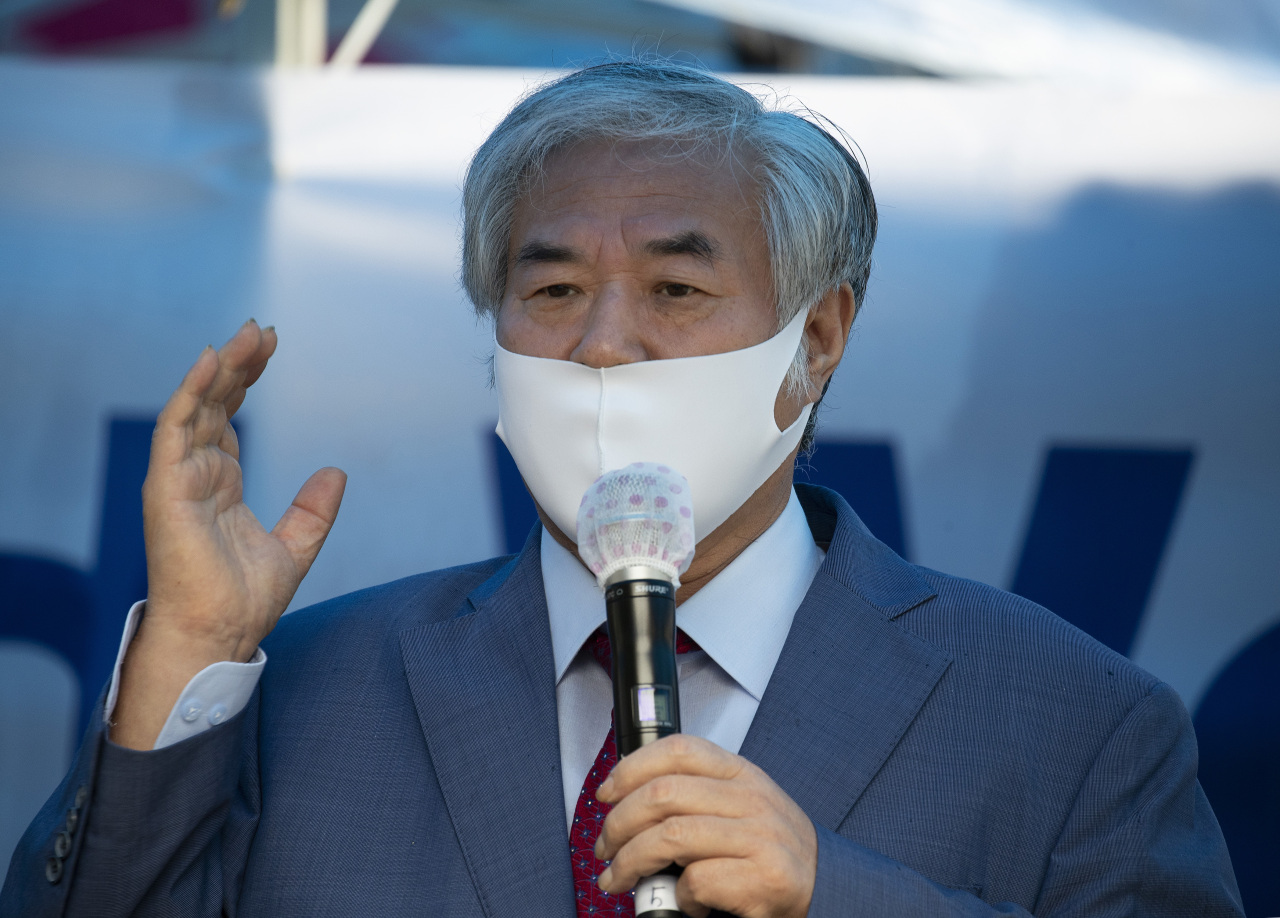The government has repeatedly warned that it would take stern action against the “bad apples” that impede efforts to combat the virus, such as requesting reimbursement for all the medical treatment and quarantine costs it has incurred. But claiming damages from violators of anti-virus rules is far more complex and daunting than they thought, according to local government officials and experts.
“The government will thoroughly strengthen crackdowns and inspections until the act of deliberately rejecting, concealing and obstructing antivirus measures is eradicated, and will strictly stick to the principle of zero tolerance if illegal activities are confirmed,” Prime Minister Chung Sye-kyun said Monday.
The Seoul Metropolitan Government plans to file a lawsuit this week for some 500 million won ($420,700) against the Sarang Jeil Church in Seoul, the source of the country’s second-largest COVID-19 cluster, and its pastor, Rev. Jun Kwang-hoon, alleging that they play a significant role in the recent resurgence of cases.
It will be the first of a series of litigations that Seoul is planning to lodge against the church.
“The government together with the Seoul city government and the National Health Insurance Service can collect about 15 billion won from the church by charging additional tax or filing suits,” the city’s Deputy Mayor Kim Woo-young said.
The city will exercise the right to indemnity for the cost of treating patients who contracted the respiratory disease from those linked to the church as well as the cost of testing, epidemiological investigations and subsidies given to those in isolation and quarantine. The medical costs for a patient with the virus total around 5 million won.
As of Monday at noon 1,162 cases linked to the church had been reported, including 639 from Seoul.
The city government alleges that the church obstructed epidemiological investigations and submitted a false contact list of church members to health authorities, leading to the loss of government funds and administrative power.
In June, the Daegu Metropolitan Government sought 100 billion won in damages from the Shincheonji Church of Jesus and its leader, Lee Man-hee, in a lawsuit that blames the controversial sect for the country’s largest cluster of COVID-19 cases, which emerged in the city in mid-February.
On Sept. 5, the Gwangju Metropolitan City said it would raise indemnity and compensation claims against seven citizens it accuses of providing false information on their whereabouts during contact tracing and refusing to get tested.
However, law experts say the chances are slim that the authorities will succeed in getting reimbursement from groups and individuals who hindered the city governments’ antivirus efforts.
“The municipal governments’ claims for indemnity seem to be aimed at giving a message to the public that they could take strong actions when the obstruction of COVID-19 containment work occurs,” said Yang So-young, attorney at the law firm Soongin.
Defining how far the government or an individual should take liability for additional costs incurred during COVID-19 containment work and specifying cause-and-effect relationships between particular group behaviors and an individual’s infection could be thorny issues.
Given that churches properties are collectively owned by church members, an individual, including a leader of the group, cannot dispose of them without consent from the congregation.
The virus resurgence that broke out in mid-August frustrated municipal governments as they believed the country had successfully brought the coronavirus under control without extreme measures such as lockdowns.
With the prolonged period of time for social distancing, contact tracing and mask wearing, the number of cases involving the virus-induced violations has grown.
According to the Korean National Agency on Monday, some 1,900 people have been indicted or are facing police investigation on allegations of violating the infectious disease prevention law in connection with the coronavirus.
Of them, 12 people have been arrested among 1,002 whose cases were sent to the prosecutors on charges of obstructing epidemiological investigations, violating quarantine rules or defying bans on gathering. Some 807 are under investigation by police.
Of those involved with the Sarang Jeil Church in Seoul, including Jun, a total of 179 face charges of obstructing epidemiological investigations.
Under the Infectious Diseases Control and Prevention Act, those who breach quarantine rules can be fined up to 10 million won. Violations of administrative orders to undergo diagnostic tests and not to assemble can incur fines of 3 million won and 2 million won, respectively.
A recent survey showed that the majority of South Koreans think that these punishments are not heavy enough.
According to a poll released by the Graduate School of Health at Seoul National University on Monday, 70.6 percent of respondents said that the law should be amended for social distancing policies to be successful.
On Aug. 20, lawmakers of the ruling Democratic Party proposed a bill to enable arrest without warrant for rule breakers.
The amendment allows for confirmed patients to face up to five years in prison or fines of up to 50 million won if they do not comply with directions from health authorities.
(
hnpark@heraldcorp.com)







![[Today’s K-pop] Blackpink’s Jennie, Lisa invited to Coachella as solo acts](http://res.heraldm.com/phpwas/restmb_idxmake.php?idx=644&simg=/content/image/2024/11/21/20241121050099_0.jpg)
